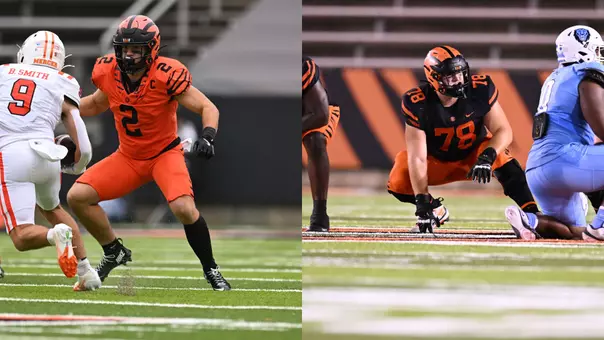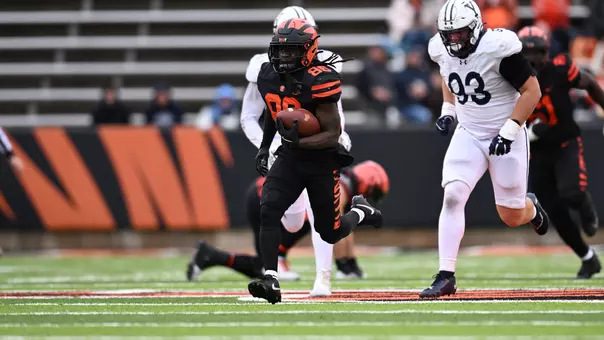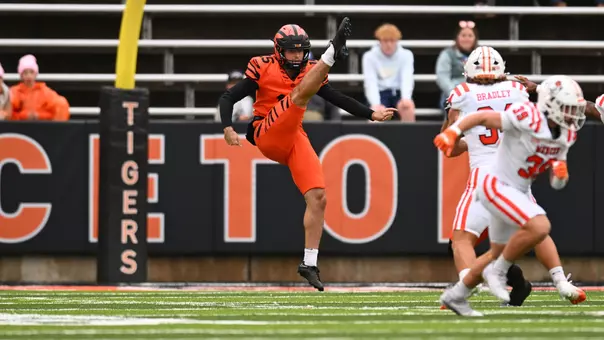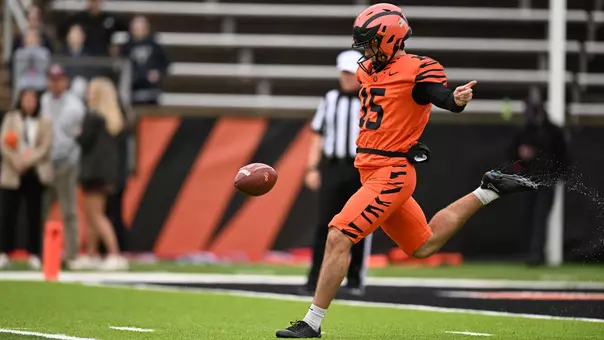Princeton University Athletics

Tiger Bech Feature Story: "The Energy Of Love In The Universe"
January 15, 2025 | Football
How do you write the unwritable? How do you even sit across the table for an hour from the two of them — the mother who lost her son two weeks earlier and the best friend who lost half of himself, with the half that’s left battered, both mind and body?
How do you convey their emotions? How do you even watch two people who use every ounce of effort to support each other, seemingly melting together, an invisible and yet obvious halo of grief that binds them?
Maybe that’s the whole story. Maybe all that should be written is an apology, a plea for forgiveness for interfering at a time like this.
Look across the table, though. Look closely. Listen to what they say. See their faces as they say it. Suddenly it becomes obvious that the two people sitting there need this, want this. They want this story told, the story of Tiger Bech, who he was in life — “the best person I’ve ever met, with the biggest heart I’ve ever seen,” his best friend said — and who he is in death — “the energy of love in the universe,” his mother says.
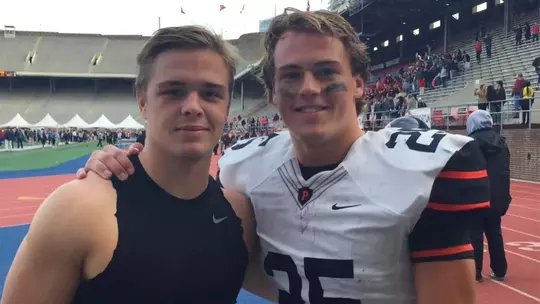
Only one player in the history of Princeton football has ever carried the ball at least 200 times and averaged more yards per carry than the 5.6 that Ryan Quigley did in a career that saw him rush for 1,192 yards and 14 touchdowns before graduating in 2020. He was a key part of the record-setting offense of the 2018 team, the one that went 10-0.
On this gray January morning, Ryan Quigley is leaning on a walker, his right knee in a massive brace. The bridge of his nose and his right eyebrow both have massive cuts and bruises. He wears a white baseball hat, a Philadelphia Eagles one, and it covers a head that has further evidence of the trauma that he recently sustained.
The woman who is helping him is Michelle Bech. She has on no makeup. A long black winter coat dominates her appearance. Her long, dark hair has been hastily brushed. She is apologizing, needlessly, for how she looks, explaining that she has just rolled out of bed. In doing so, she first reveals her Southern roots.
Home for Michelle is Lafayette, Louisiana, and she is far away from there at this moment. She and Ryan are standing together outside of an apartment building in Philadelphia, where her daughter Ginny lives with her fiancé. Michelle is standing there only to make sure Ryan can get into the car that arrives to take him to breakfast, and it takes a bit to convince her to join as well. She agrees to come with Ryan, saying that she’ll sit off by herself at a different table.
About 15 minutes later, the two of them are on the same side of the same table in a Center City restaurant. From their vantage point, they can look out into Rittenhouse Square. Those who are walking briskly along 18th Street or are slowly walking their dogs through diagonal pathways through the park were no doubt startled to wake up on New Year’s Day to the news of the attack in New Orleans hours earlier, the news in which 14 people were murdered while nearly 60 more were hurt. What did they think to themselves? “How horrific?” Did they shake their heads. Did they get angry, sad, some combination of both?
And then what? Back to everyday life, back to a New Year, back to work, back to school — that’s what is likely.
Ryan Quigley was one of the injured in that attack. His huge brace is securing a leg that has a broken fibula, a torn ACL and torn meniscus, all of which will require surgery soon. He also has a bad back, with lacerations and bruises — “road rash,” he calls it — over most of his body.
Tiger Bech, his Princeton football teammate and best friend, was one of the 14 killed. Michelle Bech is Tiger’s mother. For Ryan Quigley and Michelle Bech, there is no return to everyday life, no escape from what happened only 14 days earlier. For them, there are brief moments of respite, until the reality returns to slap them in the face yet again.
It’s hard for them to talk for more than a few moments without starting to cry. Michelle smiles briefly when she talks about her family’s deep Louisiana State University roots and how her son Martin was nicknamed “Tiger” even before he was born, only to end up as a Princeton Tiger instead. And yet, even by the end of that small anecdote, she is again teary. She often buries her face in the sleeve of her coat, or into Quigley, who comforts her as his own tears well up.
Is this too hard for them? Do they really want to relive all of this?
“I have the rest of my life to cry,” Michelle says. “I have a small window to do the best I can to honor my son in the best possible way, to let as many people know who he was.”
Tiger Bech was only 27 years old when he was killed on Bourbon Street. Like Quigley, Bech was also a member of the unbeaten 2018 team. He was a two-time All-Ivy League selection as a kick returner, and his career numbers as a wide receiver were 53 receptions, 825 yards, three touchdowns and a 15.6 yards per catch average that is tied for 10th best in program history. His impact on Princeton and people everywhere extended way beyond the football field.
“I could talk about Tiger for years,” Quigley says. “Our No. 1 goal now is to tell the world who he was as a person. If the world had more Tiger Bech’s in it, then it would be a much better place. His energy was so vibrant. He loved life. Maybe his most endearing quality was the way he went out of his way to include everyone. Maybe it was the weakest person. Maybe it was a child with a disability. Maybe it was someone who wasn’t that close with the friend group in the room. It was unbelievable how he went out of his way to be friends with so many different people in the Princeton community and everywhere. He did this his entire life. It was extraordinary.”
Quigley first met Bech on his official visit to Princeton and in fact Bech was the first person he’d meet on campus, in front of the chapel. They almost hit it off in a different way than you might imagine.
“I thought he was stubborn,” Quigley says. “I thought I was going to fight him. But you know, that only made me want to be friends with him even more. He had an edge about him that made me want to be in his corner. If anything ever happened, he was the type of person who’d have your back. He loved everyone. He could make everyone feel like they were his good friend.”
That was the beginning of a friendship that would only get stronger through the years, Bech from Louisiana, Quigley from not far from where he was having breakfast, in the Philly suburb of Lansdale.
“We were brothers,” Quigley says.
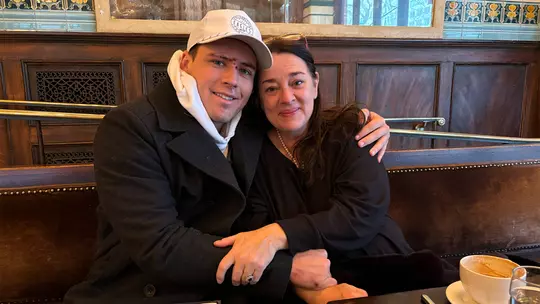
The restaurant is not crowded in mid-morning. On two separate occasions, a person who is sitting alone at a table nearby is greeted with a big hug and smile from someone who has joined them. The emotions of those hugs seem tame comparatively.
Michelle is not hungry and instead slowly sips her coffee. Quigley orders avocado toast and a breakfast sandwich. When Rocco the waiter asks him if needs anything, Quigley asks for hot sauce.
“Tabasco,” Michelle says to Rocco. Then she reminds the table that “Tiger loved Tabasco.”
As Quigley sits there, he certainly looks like a former football player. He has a steely jaw and piercing blue eyes, and, with his leg brace under the table and walker tucked away to the side, he certainly looks like he could go get you another 5.6 yards anytime you need it.
Only hours before the truck attack, Bech and Quigley had been duck hunting in Mississippi with another teammate, Zach Kelly, who did not come with them afterwards. Michelle and her husband Marty had driven them to New Orleans, had a sushi dinner with them and then driven back to Lafayette.
Once Michelle and Marty left to head back home, Bech and Quigley met up with some of his friends from Lafayette.
“That’s who he was,” Quigley says. “He was always connected to all of his friends. He’d always make sure he saw them whenever he had the opportunity.”
It was after midnight when they first started walking around Bourbon Street. They listened to music while eating chicken tenders and fries and then eventually went back outside to go to their hotel.
“I didn’t hear it,” Quigley says. “I didn’t see it. I don’t remember anything. I just got hit, and when I woke up, I was in the hospital. They told me I had been conscious on the street.”
“They said he was asking where his friend was and saying that they should take care of all the people around him,” Michelle says. “He was saying that he was okay.”
In reality, he was not okay, though he was in many ways lucky. He was still alive. A paramedic and a police officer who had treated him on Bourbon Street came to see him in the hospital.
“They told me that they could see my skull at first, before they bandaged me,” he says. “They said I was the only one in that area who was still alive. They told me it was 50-50 if I would even make it, and they said that it was a miracle.”
The paramedic said that Quigley had to have someone who was looking out for him.
“I firmly believe it was Tiger,” he says.
Bech was a step or two behind Quigley when the attack started. It’s quite likely he never saw or heard anything either, and it’s also possible that he was brain dead instantly, even if his heart was still beating. One report suggested that he had pushed a young woman out of the way to save her life, an account that a paramedic says had to have happened, given where the girl landed and where Bech did. There was video that showed the impact, but it was not conclusive as to the series of events. There is simply no way to know what happened in that split-second.
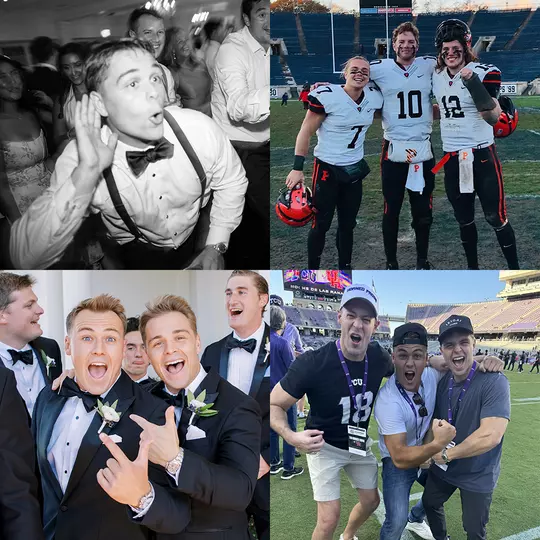
There aren’t many places anywhere that are friendlier than Lafayette, Louisiana. Michelle laughs at the memory of when Tiger, accepted to Princeton, brought cupcakes to the baseball team’s hotel at the 2016 NCAA tournament there.
“It’s a great place,” she says. “The people are so nice. They’re so welcoming.”
You can see how she must fit in there, even in this moment. She smiles at Rocco each time he asks if she is okay. She is concerned about Quigley, clearly. Her instinct is a motherly smile. It’s not hard to imagine her in a nicer time, sending her son off with baked goods to a hotel.
Lafayette is about a two-hour ride from New Orleans, with LSU in Baton Rouge the halfway point. She and her husband were home in bed, somewhere between 5 and 6 am on New Year’s Day, when she first knew something had to be wrong.
“The doorbell was ringing,” she says. “Ding. Ding. Ding. Ding. Nonstop. We knew it had to be something bad. It was our daughter’s friend, and she had just had a newborn baby. Our daughter had called her, knowing she would be awake, and she came to see us.”
Once they started to comprehend what had happened in New Orleans, Marty called all of the hospitals in the city. Nobody had a record of a “Tiger Bech” there. With no word about his son’s fate, Marty immediately jumped in his car and started to the city.
Marty Bech is the general counsel for Acadian Ambulance, a large Southern company. He made some calls along the way, and eventually he was told that there was a John Doe who fit Tiger’s description who was coming out of surgery.
“When my husband walked through the doors, someone told him that they needed more blood,” says Michelle, who followed behind Marty in a different car. “He knew that was bad. When we went up to the trauma area, there were 20 people who were working on him. It was incredible how many people were trying to save his life.”
His heart held on for a few hours, which gave the rest of the close family a chance to be there.
“He was already cold,” Michelle says. “I think the hospital was keeping him alive until we could all be there. I think he’d been brain dead for a while. It didn’t look like him at all.”
Then she pauses. Quigley puts his arm around her.
“We were all there for his last breath,” she says. “He was the energy of love in the universe. He lived life so fearlessly. He feared nothing. As a parent, your instinct is always to try to pull him back. Now we realize that where there is fear, faith cannot exist. I want to walk in the steps he walked in. He wasn’t afraid of death, really like no human I have ever met.”
It would be Michelle and Marty who would tell Quigley that Tiger was gone.
“I freaked out,” he says.
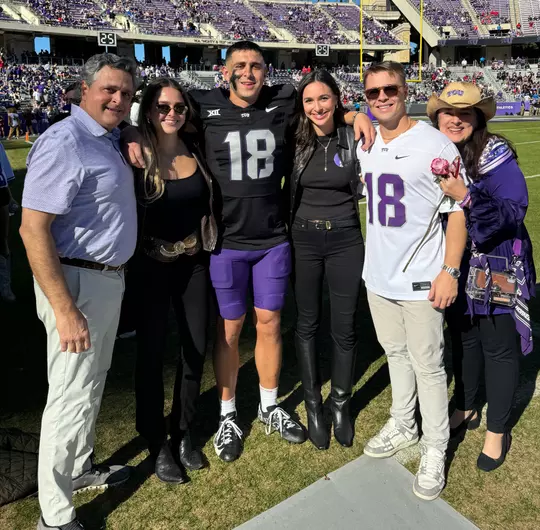
Bech and Quigley were due to fly back to New York City, where they both worked for Seaport Global, on New Year’s Day. Instead, only a few days later, several thousand people came to Tiger’s funeral, a number that included Princeton head coach Bob Surace and Princeton defensive coordinator Steve Verbit, as well as Bech’s high school coach from St. Thomas More in Lafayette and from Loomis Chaffee, where he had spent a postgrad year. The livestream of the ceremony drew 11,000 viewers.
Texas Christian coach Sonny Dykes was there too. Bech’s brother Jack (there is also another daughter, Sophie) had started his college career at LSU before transferring to TCU, and he is a very likely NFL Draft choice this spring. Dykes skipped the introductory press conference for a new athletic director at TCU to be there. Louisiana Governor Jeff Landry ordered state flags to half-staff in Tiger’s honor.
“The funeral was such a wonderful celebration of life,” Quigley says. “After, we went outside to say a prayer for Tiger.”
The Bech family had one detail that they wanted — the song “Stairway to Heaven” to play at this point. And not the Led Zeppelin version. No. The Bech’s were very specific.
“We wanted it to be the version Heart played at the Kennedy Center,” Michelle says. “It was the one thing we really wanted. We even had them pull it up on the internet so that everyone would know what we wanted. We talked about that more than anything else.”
Instead, as they were outside, something different, something eerie, happened.
“The sky was so beautiful that day,” Quigley says. “The sun was shining in a way I’ve never seen before, really. Then a big gust of wind came along. And then the song came on. Only it wasn’t ‘Stairway to Heaven.’ It was ‘Freebird.’ We immediately looked in the direction of the priest and the funeral director, and they were so sorry. They didn’t know how it happened.”
How did they end up with “Freebird?” Nobody knew. Or maybe Quigley did.
“The loudspeakers started blaring this song,” Michelle says. “My soul was soaring. I was wondering if I was in some beautiful horror movie.”
“I later told Mr. and Mrs. Bech that it was the theme song of Princeton Football,” Quigley says. “We played it every day in the locker room. Nobody knew that though. I’m pretty sure it was Tiger who chose the song.”
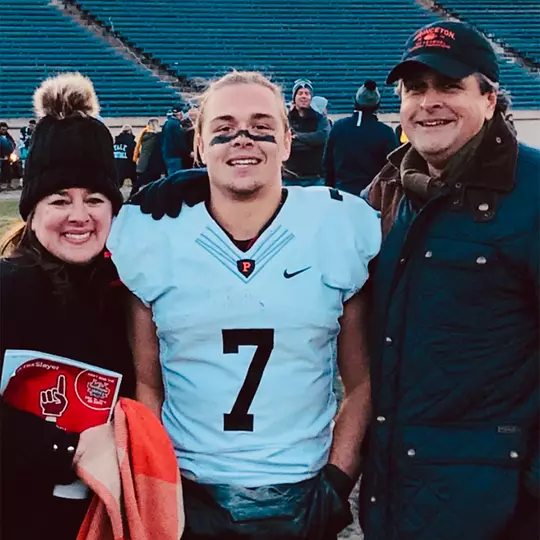
Jim Hightower is the head football coach at St. Thomas More. He has won more than 400 games, something only one other Louisiana high school coach can say.
“Coach Hightower has this beautiful Southern twang,” Michelle says. “A few years ago, after Tiger had graduated, Coach Hightower said to me ‘Meee-shell, that boy of yours is an enigma. I thought I understood what enigma meant but I looked it up anyway. I can tell you that I will never in my life meet anyone else like him.”
Quigley adds to that statement with his own punctuation: “never, never, ever.” It was Quigley who got Bech the job at Seaport, even though Bech had no finance background.
“Tiger was one of the most talented individuals I’ve ever met,” Quigley says. “He could start something he’s never had his hands on before and turn it into the best. He could take a class at school that he knew nothing about and intellectually just have a different way of thinking about things. He could pick them up immediately. The same is true of work. Usually it takes people two years in that job to figure it out. Tiger was doing it in two or three months. He was crushing it. He loved his job so much that he would tell the guys that he’d rather be at his desk than in the duck blind while we were there.”
At one point, Bech made himself a bucket list and was determined to check off each item. He’d only have time for one, running with the bulls in Pamplona, Spain, something he and Quigley did together. Quigley has now vowed that he will check off all of the others.
“I will do them all,” he says. “I feel so grateful to be alive. I wish I could talk to him, but I know that I have the best guardian angel with me for the rest of my life though.”
Quigley has picked at the avocado toast and taken the breakfast sandwich to go. He has to hurry back for the latest in a series of doctor’s appointments. This time, it is with an orthopedic specialist who works with the Eagles, among others.
The distance from the front of the restaurant back to the car is less than the distance it takes to get a first down in football. Still, it is a challenge for Quigley, who very slowly backs his way into the front seat while Michelle helps him. Once they are back to the apartment building, she helps him out of the car while the walker is brought from the trunk.
Quigley says thank you for giving him the opportunity to talk about his friend, to tell his story, and if even just one more person gets to know who Tiger Bech really was then it was all worth it. Quigley then starts to gingerly make his way to the building’s front door. Michelle starts after him and then stops for a hug. She too is thankful for having had the chance to talk about her son again — no matter how painful it was at times.
Then she is off, back to her daughter’s apartment, back to the grief, back to the reality. The next day she was off to Princeton, for one more day “to be around Tiger’s favorite places” before she flew back to Louisiana.
“He was living his best life,” Michelle says. “He must have told us 100 times — ‘Mom, Dad, nobody has a greater life than I do.’ I bet if he had a way to come back, he’d say ‘no way.’ This is what his life was meant to be. He touched so many people. Nobody will ever forget him. And he’s here still. He’ll always be here.”

The last day of Tiger Bech’s life was spent in the duck blind, in Mississippi, doing what he did best — bringing people together. Fortunately, Quigley made a video of it. This is a moment that will be forever frozen in time. This is the moment that showcased all of Tiger Bech.
He is dressed in camouflaged hunting gear, with a green hat, in the blind, hidden away in the marsh, waiting for the ducks. If you’re supposed to be quiet while you’re hunting, Bech is not. It wasn’t his nature. Instead, he is laughing, loudly. No duck would be fooled by his outfit, not with all the noise he is making.
The video shows a sky full of sunshine. There is joy in the marsh. There is friendship. There is music — the Disturbed version of “Sounds of Silence.”
“This is the most beautiful memory I will have of him,” Michelle says. “There, in the duck blind, with that beautiful sky, playing that song. I will watch it every day for the rest of my life.”
Her son is there, front and center. At times he is looking straight into the camera. He claps. You can’t help but be drawn to him. If you watch the video, you want to be in it. You want to be there with him.
It's just that you know you can’t. And you never will have the chance.
— by Jerry Price



.png&width=24&type=webp)


